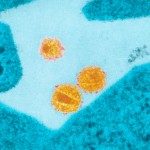Lien vers Pubmed [PMID] – 17507667
FASEB J 2007 Oct; 21(12): 3262-71
Nonhuman primates, including African green monkey (AGM), are important models for biomedical research. The information on monkey genomes is still limited and no versatile gene expression screening tool is available. We tested human whole genome microarrays for cross-species reactivity with AGM transcripts using both long oligonucleotide arrays (60-mer probes) and short oligonucleotide arrays (25-mer). Using the long oligonucleotide arrays, we detected 4-fold more AGM transcripts than with the short oligonucleotide technology. The number of detected transcripts was comparable to that detected using human RNA, with 87% of the detected genes being shared between both species. The specificity of the signals obtained with the long oligonucleotide arrays was determined by analyzing the transcriptome of concanavalin A-activated CD4+ T cells vs. nonactivated T cells of two monkey species AGM and macaque. For both species, the genes showing the most significant changes in expression, such as IL-2R, were those known to be regulated in human CD4+ T cell activation. Finally, tissue specificity of the signals was established by comparing the transcription profiles of AGM brain and tonsil cells. In conclusion, the ABI human microarray platform provides a highly valuable tool for the assessment of AGM gene expression profiles.











